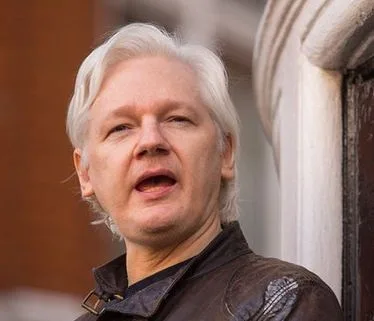Dispute with Lenin Moreno could put Julian Assange’s London refuge in jeopardy
You might think that the world’s best-known fugitive from U.S. law would want to stay on good terms with the government that is shielding him. But that’s not the way Julian Assange operates.

Julian Assange
The WikiLeaks founder, who has been holed up in the Ecuadoran Embassy in London since 2012, is embroiled in a spat with the South American country’s new president, Lenín Moreno, about Assange’s vocal support for Catalonian separatists.
Moreno, who assumed office in January, has asked Assange to stay out of the constitutional crisis in Spain, prompting this riposte from the self-styled champion of freedom of information:

But Assange, who is wanted in Sweden for alleged sex offenses and potentially in the United States for publishing state secrets, might want to think twice before antagonizing Moreno. The new president seems bent on charting a different course than his mentor and predecessor, Rafael Correa, the brash leftist who first gave refuge to the Australian activist.
Moreno, who is openly seeking to replace Correa’s confrontational approach with “dialogue,” is encouraging corruption investigations of the former president’s inner circle and has largely stopped enforcing a law that once caused human rights groups to label Ecuador’s media the least free — other than Cuba’s — in the Western Hemisphere. He has also described his predecessor as an authoritarian with an “obsession with maintaining power” and has just proposed a plebiscite on limits to presidential reelection that would effectively quash any bid by Correa to return to power in 2021 or anytime thereafter.
Correa has responded with a string of characteristically outspoken attacks on Moreno, calling him a “traitor,” “mediocre” and a “wolf in sheep’s clothing.”
All in all, Moreno appears to be trying to reposition Ecuador away from Venezuela’s “Bolivarian socialist” axis while modeling himself on impeccably democratic Latin American leftists such as Chile’s Michelle Bachelet and the former Uruguayan leader José Mujica.
That could spell trouble for Assange, whose continued residence in the Ecuadoran Embassy brings Moreno scant domestic political benefits while defining Ecuador as a geopolitical outlier antagonistic to the United States and other major Western powers.
Moreno has publicly stated that he will maintain Assange’s asylum. But he has included a highly specific caveat: “as long as we assume his life may be in danger.” The president has also previously dismissed the WikiLeaks boss as a “hacker.”
Among those who think Moreno may already be wondering how to end the impasse over Assange is César Ricaurte, head of Fundamedios, a Quito-based nonprofit that advocates for press freedom and had numerous run-ins with Correa.
“The situation of Assange in the embassy is unsustainable,” Ricaurte said. “He has converted himself into this great conspirator against the major democracies. I think the government is looking for a way out.”
Ramiro Crespo, a financial analyst in Quito, the Ecuadoran capital, predicts that the president will bide his time, first focusing on winning his war with Correa.
Moreno has approval ratings touching 80 percent but no clear legislative majority, given that his Alianza País (Country Alliance) party is split between Correa supporters and reformists. Correa loyalists also still control the courts and many other public institutions.
“Moreno has to pick his battles and dismantle Correa’s machinery bit by bit,” Crespo said. “He is being cautious. Dealing with Assange is not the priority right now, but Moreno could decide to make a move once he feels stronger.”
Exit strategies could include the president pressuring Assange to leave the embassy voluntarily. He might also seek an assurance from Washington, with whom he has a warming relationship, that capital punishment be ruled out in any potential trial.
Or he might simply suspend indefinitely the WikiLeaks activist’s Internet connection — as Correa briefly did ahead of the 2016 U.S. presidential election — citing his refusal to refrain from political activity.
For now, Moreno has his hands full battling to break his predecessor’s grip on Ecuador’s many branches of power. Assange, however, would be wise to prepare for a new reality in which he can no longer depend on a steadfast protector in Quito.
_________________
Credit: The Washington Post, www.washingtonpost.com




















